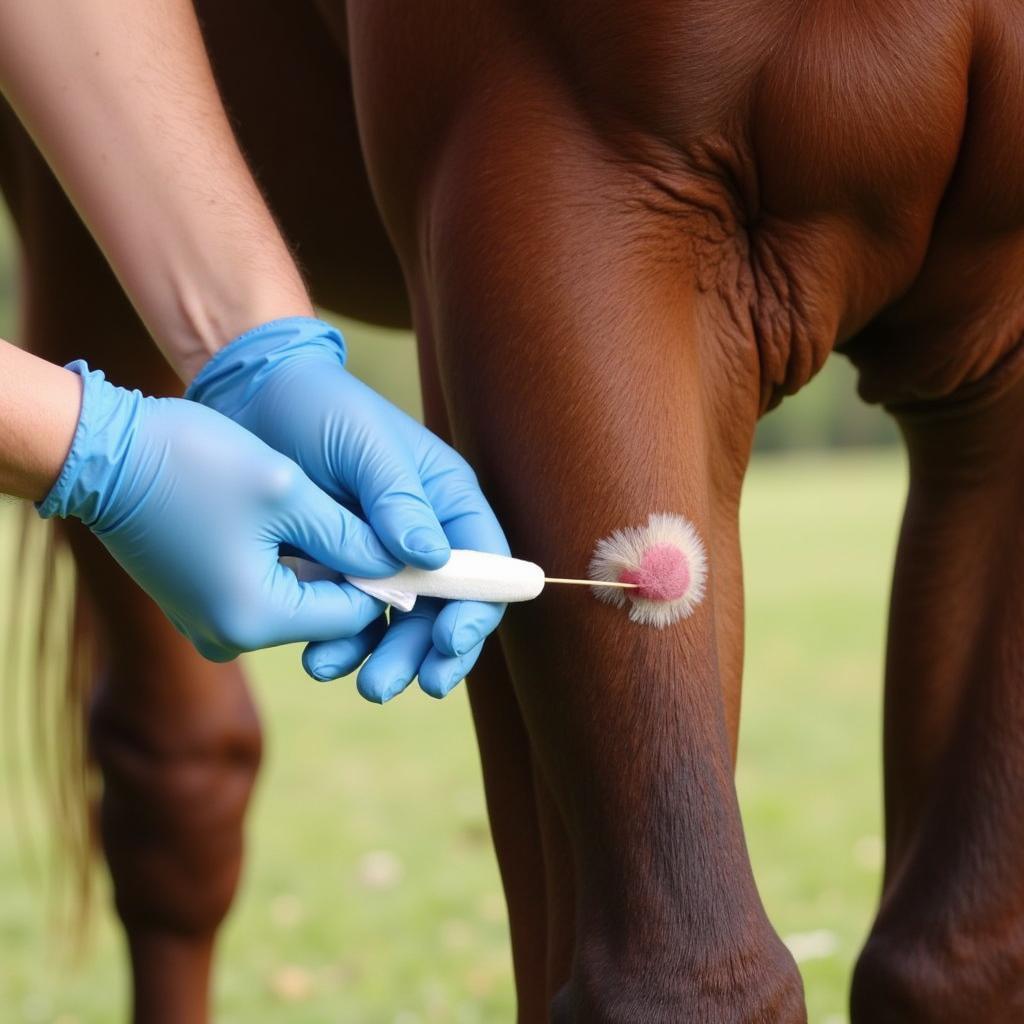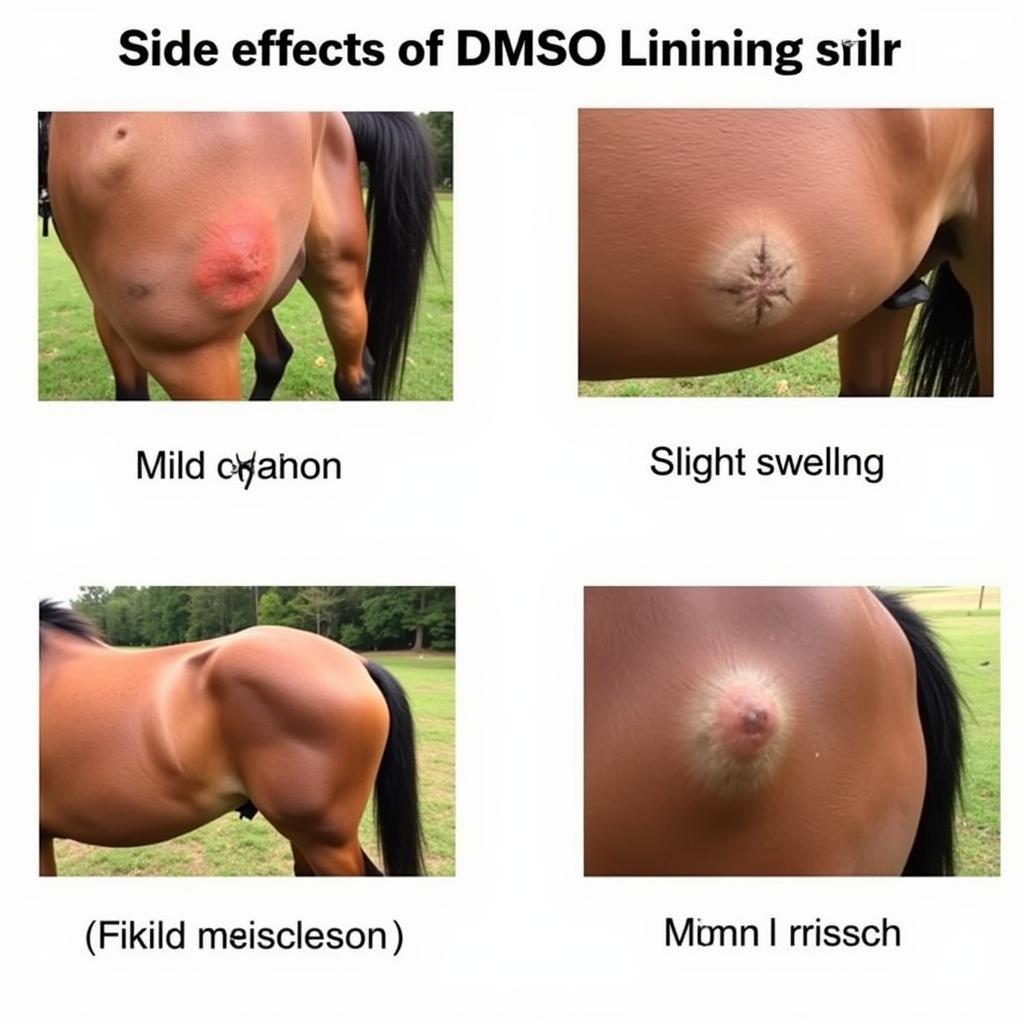Dmso Horse Liniment is a common topical treatment used for horses to address various musculoskeletal issues. From reducing inflammation to potentially aiding in pain relief, understanding the proper use, benefits, and risks of this liniment is crucial for any horse owner. This guide will delve into everything you need to know about DMSO horse liniment, equipping you with the knowledge to make informed decisions about your horse’s care.
Understanding DMSO Horse Liniment
DMSO, or dimethyl sulfoxide, is a colorless, odorless liquid byproduct of the wood pulping process. It’s known for its anti-inflammatory and analgesic properties, which are why it’s frequently used in horse liniments. When applied topically, DMSO penetrates the skin quickly, carrying other ingredients in the liniment with it. This allows for faster absorption and potentially more effective treatment.
How Does DMSO Horse Liniment Work?
DMSO horse liniment works primarily by reducing inflammation in the affected area. It acts as a free radical scavenger, neutralizing harmful molecules that contribute to inflammation and pain. Additionally, DMSO may improve blood flow to the area, further promoting healing. While the exact mechanisms are still being studied, its practical application in equine care has shown promising results.
 Applying DMSO Horse Liniment
Applying DMSO Horse Liniment
Benefits of Using DMSO Horse Liniment
DMSO horse liniment is often chosen by horse owners and veterinarians for its potential benefits:
- Reduced Inflammation: DMSO is well-known for its anti-inflammatory properties, potentially offering relief from swelling and discomfort.
- Pain Relief: The analgesic properties of DMSO can help manage pain associated with various equine conditions.
- Improved Blood Flow: Enhanced blood circulation can contribute to faster healing and tissue repair.
- Versatile Application: DMSO liniment can be used for a range of musculoskeletal issues, from sprains and strains to arthritis.
Potential Risks and Side Effects
While DMSO can be beneficial, it’s important to be aware of the potential risks:
- Skin Irritation: Some horses may experience mild skin reactions, such as redness or itching.
- Garlic-like Odor: DMSO can cause a temporary garlic-like odor on the horse’s breath and skin.
- Drug Interactions: DMSO can increase the absorption of other medications, so consult your veterinarian before using it with other treatments.
 Potential Side Effects of DMSO Horse Liniment
Potential Side Effects of DMSO Horse Liniment
Proper Application of DMSO Horse Liniment
Correct application is crucial for both efficacy and safety:
- Clean the Area: Thoroughly clean the affected area with warm water and soap.
- Wear Gloves: Always wear gloves when handling DMSO to prevent absorption through your skin.
- Apply Evenly: Apply a thin layer of the liniment to the affected area, avoiding open wounds.
- Do Not Bandage: Unless specifically instructed by your veterinarian, avoid bandaging the area after application.
What Conditions Can DMSO Horse Liniment Treat?
DMSO horse liniment is commonly used to address various conditions, including:
- Sprains and strains
- Tendonitis and desmitis
- Arthritis
- Back pain
- Muscle soreness
“DMSO can be a valuable tool in managing equine musculoskeletal issues,” says Dr. Sarah Miller, DVM, specializing in Equine Sports Medicine. “However, it’s essential to work closely with your veterinarian to ensure proper usage and address any potential complications.”
Conclusion
DMSO horse liniment offers potential benefits for managing various musculoskeletal issues in horses. Understanding its proper application, potential risks, and benefits is crucial for responsible horse ownership. Always consult your veterinarian before starting any new treatment, including DMSO, to ensure its suitability for your horse’s specific condition.
FAQ
- How often should I apply DMSO horse liniment?
- Can I use DMSO on open wounds?
- What should I do if my horse experiences a skin reaction to DMSO?
- Is DMSO safe to use on pregnant mares?
- Can I use DMSO with other medications?
- How long does it take for DMSO to work?
- Where can I purchase DMSO horse liniment?
You might also be interested in our other articles on horse care and first aid. Explore our website for more helpful resources!
For any assistance, please contact us at Phone Number: 0772127271, Email: [email protected], or visit us at QGM2+WX2, Vị Trung, Vị Thuỷ, Hậu Giang, Việt Nam. Our customer service team is available 24/7.